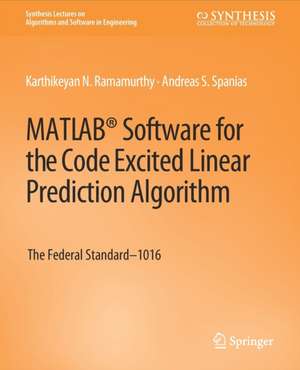MATLAB® Software for the Code Excited Linear Prediction Algorithm: The Federal Standard-1016: Synthesis Lectures on Algorithms and Software in Engineering
Autor Karthikeyan Ramamurthy, Andreas Spaniasen Limba Engleză Paperback – 4 mar 2010
Din seria Synthesis Lectures on Algorithms and Software in Engineering
-
 Preț: 380.37 lei
Preț: 380.37 lei -
 Preț: 384.31 lei
Preț: 384.31 lei -
 Preț: 351.11 lei
Preț: 351.11 lei -
 Preț: 262.47 lei
Preț: 262.47 lei -
 Preț: 206.29 lei
Preț: 206.29 lei -
 Preț: 192.63 lei
Preț: 192.63 lei -
 Preț: 206.29 lei
Preț: 206.29 lei -
 Preț: 261.91 lei
Preț: 261.91 lei -
 Preț: 192.05 lei
Preț: 192.05 lei -
 Preț: 204.76 lei
Preț: 204.76 lei -
 Preț: 204.76 lei
Preț: 204.76 lei -
 Preț: 379.48 lei
Preț: 379.48 lei -
 Preț: 414.65 lei
Preț: 414.65 lei -
 Preț: 192.41 lei
Preț: 192.41 lei -
 Preț: 389.88 lei
Preț: 389.88 lei -
 Preț: 205.92 lei
Preț: 205.92 lei -
 Preț: 260.56 lei
Preț: 260.56 lei -
 Preț: 207.83 lei
Preț: 207.83 lei -
 Preț: 266.70 lei
Preț: 266.70 lei -
 Preț: 381.43 lei
Preț: 381.43 lei
Preț: 260.95 lei
Nou
Puncte Express: 391
Preț estimativ în valută:
49.93€ • 52.27$ • 41.56£
49.93€ • 52.27$ • 41.56£
Carte tipărită la comandă
Livrare economică 31 martie-14 aprilie
Preluare comenzi: 021 569.72.76
Specificații
ISBN-13: 9783031003868
ISBN-10: 3031003861
Ilustrații: IX, 99 p.
Dimensiuni: 191 x 235 mm
Greutate: 0.2 kg
Editura: Springer International Publishing
Colecția Springer
Seria Synthesis Lectures on Algorithms and Software in Engineering
Locul publicării:Cham, Switzerland
ISBN-10: 3031003861
Ilustrații: IX, 99 p.
Dimensiuni: 191 x 235 mm
Greutate: 0.2 kg
Editura: Springer International Publishing
Colecția Springer
Seria Synthesis Lectures on Algorithms and Software in Engineering
Locul publicării:Cham, Switzerland
Cuprins
Introduction to Linear Predictive Coding.- Autocorrelation Analysis and Linear Prediction.- Line Spectral Frequency Computation.- Spectral Distortion.- The Codebook Search.- The FS-1016 Decoder.
Notă biografică
Karthikeyan Natesan Ramamurthy is a research staff member in the Business Solutions and Mathematical Sciences department at the IBM Thomas J. Watson Research Center in Yorktown Heights, NY. He received his M.S. and Ph.D. degrees in Electrical Engineering from Arizona State University. His research interests are in the areas of low-dimensional signal models, machine learning, data analytics, and computer vision. He has been a reviewer for a number of IEEE and Elsevier journals and conferences. Andreas Spanias is a professor in the Department of Electrical Engineering, Fulton School of Engineering at Arizona State University. He is also the director of the SenSIP consortium. His research interests are in the areas of adaptive signal processing, speech processing, and audio sensing. Prof. Spanias has collaborated with Intel Corporation, Sandia National Labs, Motorola, Texas Instruments, DTC, Freescale, Microchip, and Active Noise and Vibration Technologies. He and his student team developed the computer simulation software Java-DSP ( J-DSP; ISBN 0-9724984-0-0). He is author of two textbooks, Audio Processing and Coding by Wiley and DSP: An Interactive Approach. He received the 2003 Teaching Award from the IEEE Phoenix section for the development of J-DSP. He has served as associate editor of the IEEE Transactions on Signal Processing and as General Cochair of the 1999 International Conference on Acoustics Speech and Signal Processing (ICASSP-99) in Phoenix. He also served as the IEEE Signal Processing Vice President for Conferences and is currently member-at-large of the IEEE SPS Conference Board. Prof. Spanias is corecipient of the 2002 IEEE Donald G. Fink paper prize award and was elected fellow of the IEEE in 2003. He served as distinguished lecturer for the IEEE Signal Processing Society. He is currently the editor for the Morgan & Claypool Publishers series on DSP algorithms and software.
